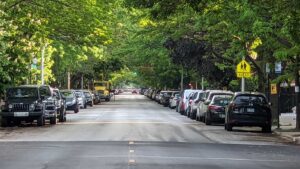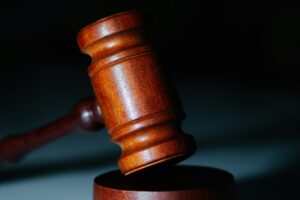Last month, the United States Court of Appeals for the Sixth Circuit issued an opinion in a minor case that may have a far-reaching impact.

The Plaintiff, Brittany Taylor, had amassed fifteen parking tickets, which began at $15. In each instance, the parking enforcement officer had chalked her tire and made a notation of the date and time of chalking. The parking enforcement officer would then return and determine if the car had been parked longer than the permitted time. Millions of us have had our cars chalked, and while most view it as a minor annoyance rather than a harm, the Sixth Circuit unanimously held that chalking might be a violation of the warrant requirement of the Fourth Amendment of the Constitution.
Getting to this result was not easy. Typically, people who incur a few hundred dollars in parking fines choose not to hire an attorney. However, Ms. Taylor was apparently very sure of her position and determined to prove her point, as she went to the Sixth Circuit twice.
Is tire-chalking considered a “search”?
In its first opinion of April 25, 2019, the Sixth Circuit held that chalking does constitute a search under the Fourth Amendment and that the case should proceed to determine if the City of Saginaw could meet an exception to the Fourth Amendment’s warrant requirement.
To find that chalking is a “search,” the Sixth Circuit set forth the relevant test: “a search occurs when a government official invades an area in which a person has a constitutionally protected reasonable expectation.”
The Court then held that “[o]nce we determine the government has trespassed upon a constitutionally protected area, we must then determine whether the trespass was conjoined with an attempt to find something or to obtain information. Here, it was. Neither party disputes that the City uses the chalk marks for the purpose of identifying vehicles that have been parked in the same location for a certain period of time. That information is then used by the City to issue citations. As the district court aptly noted, ‘[d]espite the low-tech nature of the investigative technique, the chalk marks clearly provided information to Hoskins.’ This practice amounts to an attempt to obtain information.”
What was the Sixth Circuit’s final decision?
The Sixth Circuit remanded the case to continue beyond the initial pleadings stage, which it did. On the most recent appeal, the Sixth Circuit began by providing that “[b]ecause tire chalking is a search that defendants conducted without an authorizing warrant, it is presumptively unreasonable. The warrant requirement is subject only to a few specifically established and well-delineated exceptions. It is the government’s burden to establish the applicability of an exception to the warrant requirement.”
The City of Saginaw did not raise all of the exceptions but proceeded under the administrative search exception, which generally applies to functions such as code compliance. Ultimately, the Sixth Circuit concluded that “the administrative-search exception does not justify the City’s suspicionless chalking of car tires to enforce its parking regulations.”
As such, the Court held that “tire chalking is not necessary to meet the ordinary needs of law enforcement, let alone the extraordinary.”
What does this mean for local governments?
Municipal governments are not without recourse. Not only are parking meters still permitted, but if the parking enforcement officer had merely written down the date, time, and license plate of Ms. Taylor’s vehicle and then returned later to observe the same area without touching Ms. Taylor’s vehicle, the tickets most likely would have been enforceable.
Nevertheless, the Taylor case is an interesting reminder that even mundane practices of local government like tire-chalking, which may have seemed like a routine fact of life for many Americans, must comply with the Constitution.
Pittsburgh Litigation Attorneys
Questions about government searches and enforcement actions? Attorney David Weber of The Lynch Law Group can be reached at 724-776-8000 or by email at dweber@lynchlaw-group.com.




